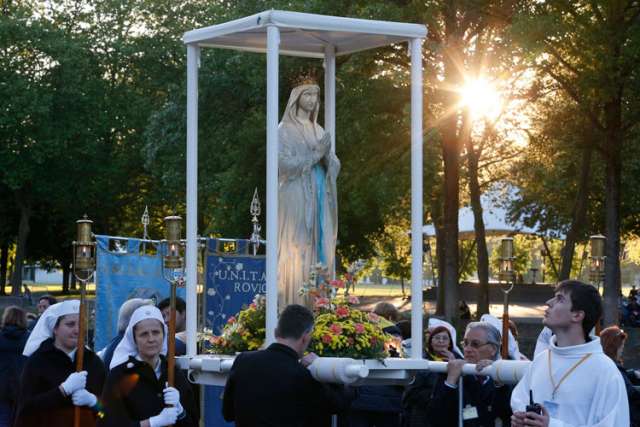The first reaction of Bishop Francesco Milito of Oppido Mamertina-Palmi, Italy, was to say that those who bowed during the July 2 procession in Tresilico "are clearly far from even a minimum spirit of pure, correct and authentic faith."
The bow, he said, was a "gesture of blasphemous devotion that is the opposite of what is due to the mother of God."
In protest the local commander of the Carabinieri, the Italian military police, and members of his squad who had been accompanying the procession with the statue of Our Lady of Grace left the procession.
Although July and August are the most popular months for the religious processions that remain a key part of annual celebrations in cities, towns and neighbourhoods, Milito announced that, beginning July 10, all processions would be suspended until diocesan leaders could work out rules and procedures for preventing their abuse.
Milito said the decision was a call to "caution and an invitation to reflection and silence," but should not be read as "a gesture of mistrust or judgment of those who contribute with dedication and righteousness to processions."
The ritual bow was made in front of the home of Peppe Mazzagatti, 82, sentenced to life in prison, but serving his sentence under house arrest because of ill health. He was convicted in connection with his presumed ties to the 'Ndrangheta, the Calabrian mafia.
Milito told SIR, the Italian bishops' news agency, that "the lack of a correct reaction on the part of participants in the procession, including clergy and people active in the life of the Church," shows just how "hardened and dulled" people's consciences are to the evil that is organized crime.
Pierluigi Natalia, a writer for the Vatican newspaper, wrote in the July 8 edition that "it certainly was not the first time something like this has happened in a region where the perversion of religious sentiment" is a characteristic of the mafia.
Because of the cultural ties to the mafia that some religious processions have had, Archbishop Salvatore Nunnari of Cosenza-Bisignano, president of the Calabrian bishops' conference, said he would stop all religious processions in the region for at least two years.
"I think it would please Our Lady," he said.
Also in early July, Italian newspapers were filled with headlines about prisoners, presumably with mafia ties, going on "strike" from attending Mass in the high-security wing of a prison in Larino. The stories said the inmates were protesting Pope Francis' remarks in Sibari in late June that "those who follow the path of evil, like the mafiosi do, are not in communion with God; they are excommunicated."
Bishop Gianfranco De Luca of Termoli-Larino, who celebrated Mass with the inmates July 6, told Vatican Radio they had not gone on strike, but the Pope's words had left them with serious questions.
"They were asking, 'Does that mean we can't go to Mass any more? Can we receive Communion if we're excommunicated?' ” the bishop said. "They were shaken up by what the Pope said."
The men had so many questions for the prison chaplain, he said, that he decided to go see them in person. Before celebrating Mass for them, he said, there was a lively discussion about how people excommunicate themselves and what repentance means.
"But there was not a mutiny nor a decision not to go to Mass," De Luca said. "Their consciences were moved by what the Pope said.
"Unfortunately," he said, "movements of the heart and soul do not make news," so media reports focused on the men being upset by the Pope's words.


